#long long long essay
Text
if I've learned anything from grad school it's to check your sources, and this has proven invaluable in the dozens of instances when I've had an MBA-type try to tell me something about finances or leadership. Case in point:

Firefox serves me clickbaity articles through Pocket, which is fine because I like Firefox. But sometimes an article makes me curious. I'm pretty anal about my finances, and I wondered if this article was, as I suspected, total horseshit, or could potentially benefit me and help me get my spending under control. So let's check the article in question.
It mostly seems like common sense. "...track expenses and income for at least a month before setting a budget...How much money do I have or earn? How much do I want to save?" Basic shit like that. But then I get to this section:

This sounds fucking made up to me. And thankfully, they've provided a source to their claim that "research has repeatedly shown" that writing things down changes behavior. First mistake. What research is this?

Forbes, naturally, my #1 source for absolute dogshit fart-sniffing financial schlock. Forbes is the type of website that guy from high school who constantly posts on linkedin trawls daily for little articles like this that make him feel better about refusing to pay for a decent package for his employees' healthcare (I'm from the United States, a barbaric, conflict-ridden country in the throes of civil unrest, so obsessed with violence that its warlords prioritize weapons over universal medical coverage. I digress). Forbes constantly posts shit like this, and I constantly spend my time at leadership seminars debunking poor consultants who get paid to read these claims credulously. Look at this highlighted text. Does it make sense to you that simply writing your financial goals down would result in a 10x increase in your income? Because if it does, let me make you an offer on this sick ass bridge.
Thankfully, Forbes also makes the mistake of citing their sources. Let's check to see where this hyperlink goes:

SidSavara. I've never heard of this site, but the About section tells me that Sid is "a technology leader who empowers teams to grow into their best selves. He is a life-long learner enjoys developing software, leading teams in delivering mission critical projects, playing guitar and watching football and basketball."
That doesn't mean anything. What are his LinkedIn credentials? With the caveat that anyone can lie on Linkedin, Mr. Savara appears to be a Software Engineer. Which is fine! I'm glad software engineers exist! But Sid's got nothing in his professional history which suggests he knows shit about finance. So I'm already pretty skeptical of his website, which is increasingly looking like a personal fart-huffing blog.
The article itself repeats the credulous claim made in the Forbes story earlier, but this time, provides no link for the 3% story. Mr. Savara is smarter than his colleages at Forbes, it's much wiser to just make shit up.
HOWEVER. I am not the first person to have followed this rabbit hole. Because at the very top of this article, there is a disclaimer.

Uh oh!
Sid's been called out before, and in the follow up to this article, he reveals the truth.

You can guess where this is going.


So to go back to the VERY beginning of this post, both Pocket/Good Housekeeping and Forbes failed to do even the most basic of research, taking the wild claim that writing down your budget may increase your income by 10x on good faith and the word of a(n admittedly honest about his shortcomings) software engineer.
Why did I spend 30 minutes to make a tumblr post about this? Mostly to show off how smart I am, but also to remind folks of just how flimsy any claim on the internet can be. Click those links, follow those sources, and when the sources stop linking, ask why.
#long post#side note- this is one of the reasons i dont cover shit i dont like in my video essays. yall havent seen me angry.
15K notes
·
View notes
Text

Mary Oliver, from Long Life: Essays And Other Writings originally published in 2004
#lit#mary oliver#quotes#writings#words#understanding#typography#fragments#quote#essays#long life: essays & other writings#p
21K notes
·
View notes
Text
I ONCE TRIED TO WASH THAT SCUFFED OLD THING WHILE HE WAS TAKING ONE OF HIS NAPS, BUT WHEN I TOOK IT OFF HE WAS WEARING ANOTHER IDENTICAL ONE UNDERNEATH! AND ANOTHER! I GOT THROUGH TEN MORE LAYERS OF THE SAME THING BEFORE HE WOKE UP. I WAS SO FRUSTRATED! WHERE DID HE EVEN GET THOSE FROM? THEY ALL EVEN HAD THE SAME STAINS!!

#originally was gonna make a fun papyrus and sans blog But um#got shy Lol#also i dont think id have been able to keep it up very long#here’S the art i made for the first post and a snippet of the long ass essay i had typed out#maybe one day i’ll revisit the idea#with less essay length posts because i think that’s what intimidated me#sans#papyrus#undertale
11K notes
·
View notes
Text
I’m actually LOVING how Rick Riordan, and the other writers of the show, took his initial concept of a Percabeth rivalry fueled by that of their parents and kind of turned it on its head?
Now, instead of Annabeth being wary of Percy because he’s a son of Poseidon, he’s wary of her because she made a callous impression on him. They get off to a rocky start even before finding out who Percy’s father is, and when they finally do, Annabeth doesn’t care. Instead of them fighting because of who their parents are, they’re fighting over their own opposed worldviews.
Then, instead of them arguing over which of the gods is cooler and who was right in the story of Medusa, they realize that, just like Medusa, Annabeth is a victim of her mother and that, unlike Medusa, she is a far kinder and stronger person, unwilling to repeat the cycle of hurt. They realize that, like his father, Percy often acts without considering potential consequences and that, unlike his father, he is a far kinder and stronger person, willing to step up for someone he wronged and whom he cares about.
Instead of Percy and Annabeth’s rivalry being focused on that of their parents, it’s focused on who they are, themselves. But the path to friendship is still the same: a realization that they have each other’s backs, no matter what, because they’re not their parents after all.
#i kind of typed this in my essay voice because I knew it would be long so ignore that#also I don’t actually know which of the other writers are playing big parts in percabeth’s story so threats why I put a focus on Riordan#that’s*#aaaaanyhoo if I’m being honest I definitely prefer this version of percabeth#AND I like that Medusa said ‘‘we are not our parents until we choose to be. you three have chosen’’ implying that she thinks they’ve chosen#to be their parents only for Percy to reveal in the next episode that he’s chosen to be better than his father.#that was a really nice touch 👌👌👌#percy jackson and the olympians#pjo#pjo disney+#percy jackson disney+#percy jackson#annabeth chase#Percabeth#rick riordan#Medusa#pjo tv show#pjo tv series#pjo tv spoilers
13K notes
·
View notes
Text
im not putting this post into words. beams into your mind The Parallels


.


.


.


.


.


.


.



.


.



.




.

.


#not a new thought at all of course but i havent seen a post thorough enough for Me. the guy who thinks about it a lot#and this isnt all my thoughts either but it at least Touches on each element that i think about...#honestly where i could talk for ages is where the similar things were Different for them. but harder to organize#if you actually went and looked at all these panels with me. thank you for coming to this Presentation and Journey#i hope my Beam is having an Effect.#dungeon meshi#dungeon meshi spoilers#delicious in dungeon#thistle dungeon meshi#marcille donato#long post#can i be forrealsies i made this post ages ago and was just referencing it while drafting one About the contrasts and accidentally hit post#so ig might as well keep it up instead of hoarding it in my drafts. and maybe ill post That essay here someday#tistle tag
4K notes
·
View notes
Text
Im already seeing really bad takes that the show didnt make Gabe “abusive enough”. First and foremost, there are so many different forms of abuse, not just physical abuse. When we first see him, he is instantly belittling Percy. You can see how much of the space he takes up in the apartment. He has a single recliner, a jersey on the wall, and a side table all for him while he gambles with Sallys money. He is immediately financially abusive and verbally abusive.
Second, he answered Sally’s phone and spoke to the principal at Yancy. He is trying to control how Sally raises her son and is giddy at getting another person to bully again. Also, he controls the car. Sally has to negotiate with him and manage his reaction to her taking her son to Montauk. In this scene we see her sass him back and tell him to ask her nicely which I think is a great way to show that Sally still has some agency in the situation. She is able to say she doesnt want to be spoken to disrespectfully.
Lastly, in The Lightning Theif, Percy states “For the first time, I realized something. Gabe had hit my mother. I didn’t know when, or how much. But I was sure he’d done it. Maybe it had been going on for years, when I wasn’t around.” This was in the second to last chapter of the book. People are mad they didnt see him hit her in the first EPISODE??? Be so for real. Give the show time to flesh everything out.
ANYWAYS STAN SALLY JACKSON AND WATCH THE SHOW
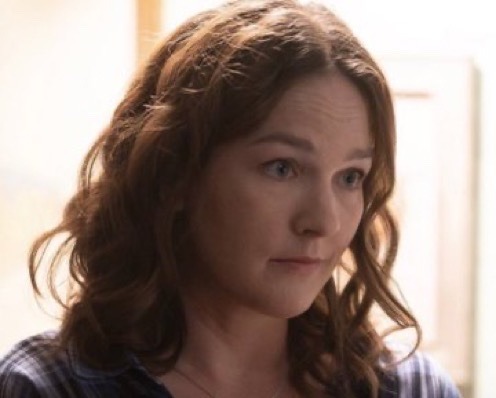
#percy jackson#sally jackson#gabe ugliano#percy jackon and the olympians#percy jackson the lightning thief#STOP WITH THE BAD TAKES PLEASE FOR THE LOVE OF GODS#in this essay i will#long post soz#walker scobell#virginia kull#tim sharpe
7K notes
·
View notes
Text






Now, you can take that as a gift, or you can take it as a curse. And that's up to you.
Eliot Spencer and Parker Doing the Things Others Won’t
Leverage (2008-2012)
04x01 The Long Way Down Job
05x09 The Rundown Job
#this parallel came to me like a fever dream last night#and I had to share the sadness with others#and then this sent me on a spiral about communication types between the ot3#Parker and Eliot understand each other so well#and a lot of what they have is silent communication#like that nod in the rundown job#between Parker and Hardison#direct communication#necessary and developed when figuring out their feelings#between Hardison and Eliot#physical and indirect communication#(ex: handshake bumping each other bickering)#I could write an essay#but instead I will leave you with this gifset#leverage#the long way down job#the rundown job#inde gifs#inde gifs: the long way down job#inde gifs: the rundown job#Eliot Spencer#Parker#inde gifs: leverage parallels#leverage parallels#fudge I need to reaclimate to tumblr fonts and heirarchy#I had no idea where to put the quote#graphic design degree and for what#inde gifs: leverage ot3#leverage ot3
2K notes
·
View notes
Text
The reason why I always emphasize that utrh era Jason is 18/19 and refuse to let people forget that Jason and Tim are canonically 2 years apart is because the concept of Jason as a fairly young adult with little to no support system is a fascinating concept to me and it goes under explored in both canon and fanon. I think it adds such an interesting wrinkle to the everything and is a great contrast to all the Red Hood shit.
I’m thinking about New Earth Jason specifically here, he’s both younger than post-nu52 Jason and more isolated. Most people at 19, even if they can afford to be out on their own in this economy, still have contact with their family of origin for support. Jason is not only estranged from his family with little to no support system (depending on how much you interpret Talia being involved after Lost Days), he’s also doing mob boss shit while he’s still technically young enough to be somebody’s prom date. He didn’t go to his prom because he was probably in Russia learning how to make bombs or something (and because, yknow, the whole dying thing).
Jason is someone who both had to grow up too fast and by all means should be somewhat emotionally stunted. Not only does trauma stunt you he was catatonic for long enough that he’s missing literal years from his adolescence. He’s young enough that he’s still reeling from trauma from childhood and adolescence (late teens/ early twenties are peak ‘desperately trying to recover from childhood’ era).
I think underneath the rough Red Hood exterior that Jason should be naive in ways that people wouldn’t really expect. He doesn’t have much experience with relationships (both romantic and friendships), and it’s been years since he’s socialized much with people his age (he doesn’t socialize much at all he’s pretty isolated). I think even if he doesn’t look young that at times he would slip up and show that he is
Also I just love the contrast. I like the idea that sometimes you’ll hear Red Hood cackle without the helmet on and you’ll recognize traces of that 15 year old kid and then he’ll shoot someone immediately after. Like imagine if utrh was a Boy King of the underworld sorta deal
#Hence why batfamy fics where Jason is Tim’s pseudo parent don’t really vibe me. 1. He would not do that 2. Those 2 are in the same age group#& 3. His childhood was fucked enough stop trying to make him a Teen Mom 😭. He’s already been a young caregiver via Catherine. ENOUGH#Jason Todd#dc#under the red hood#there she goes again with the 5 paragraph persuasive essay about The Character 🙄#long post#the yapper strikes again I fear
2K notes
·
View notes
Text

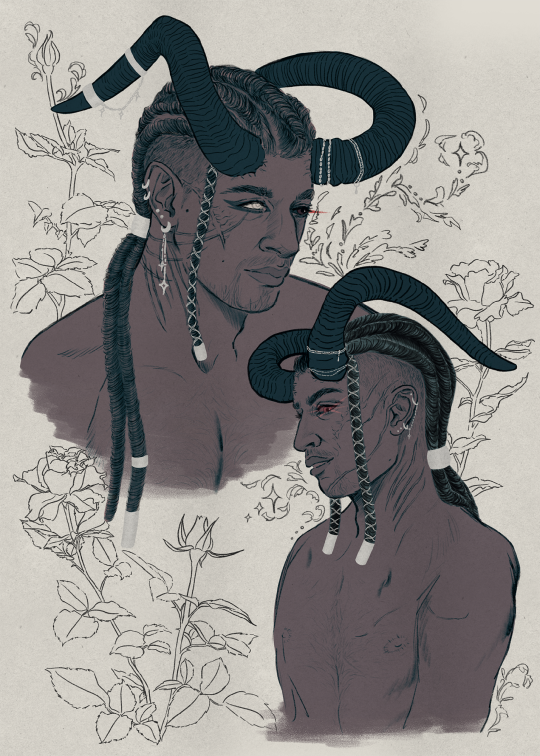
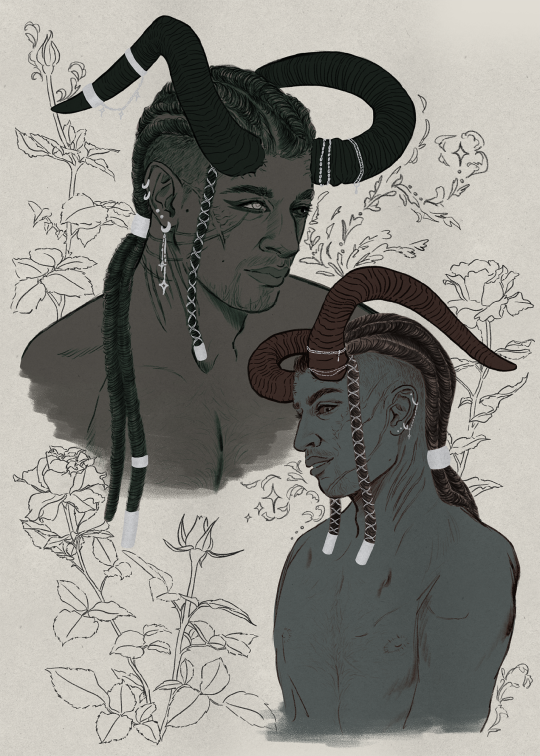
wyll.y.am ravengard, I love you so
everyone loves to put him in gold (rightly so) but my personal style is lots of silver jewelry + heavy eyeliner so that's what I gave him. also roses because he's so damn venusian
#wyll#wyll ravengard#bg3 fanart#bg3#three color versions because I'm so damn indecisive. I'm experimenting with a more sketchy style and had a lot of fun with it#I have so many thoughts about wyll and his venusian qualities; how he embodies some of the truest and starkest aspects of venus#as well as its most painful and burdensome weaknesses#I could write an essay on it but I don't know how many people live in the intersection between bg3 and classical astrology. so I won't#also - I've had this sitting in my drafts for way too long and it was in danger of entering the ''I changed my mind I don't want this to#see the light of day'' phase so Im pressing the damn button#my art
2K notes
·
View notes
Text
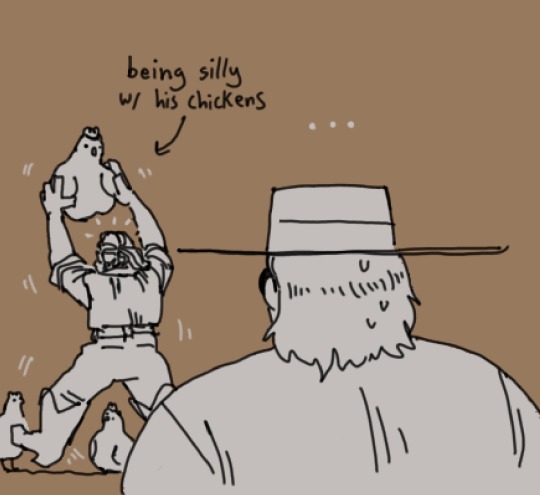
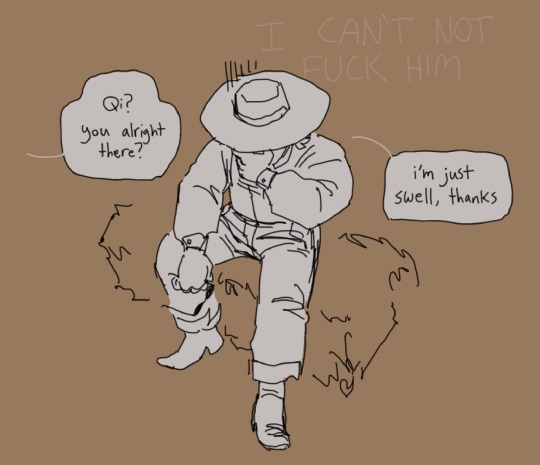
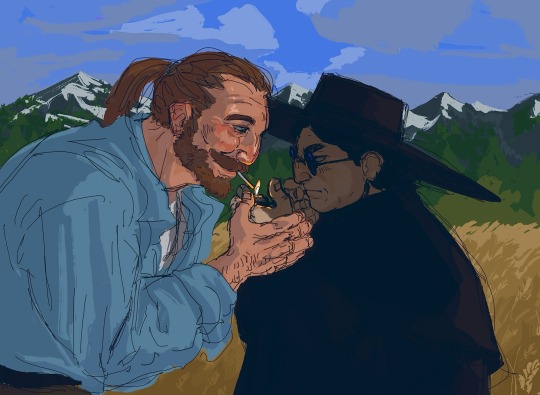
pelican town, ‘72
#stardew valley#stardew valley spoilers#sdv#sdv spoilers#grandpa#mister qi#mr. qi#idk how dates work in stardew universe im just bullshittin#i love qi’s huge fucking eyebrows you dont notice them at first but theyre there#(gives our collective grandpa a ponytail) i think he had one. whatever#’why isnt mister qi blue’ my hc is he is blue from long-term iridium supplementation#and was originally just a regular person#but also it’s nice to see ur fav be like a normal human color#if u read tag essays tho consider this:#qi discovers secret to immortality (consuming iridium in a specific manner)#wants to share discovery with his farmer (player’s grandpa) and in that way. they will have all the time in the world to build#a perfect farming/business empire whose legacy will last forever and ever and theyll be 2gether forever#but it turns out. like a lot of normal people would. his farmer does not want to live forever#and obv he doesn’t#in an attempt to try not to ever lose the thing that means more to him than anything else in the world. qi inadvertantly ensures he will#because his farmer is dead. and he’s going to live forever#but. it’s kind of ok. because he has infinite money and was able to figure out how to talk to his dead bf#and now YOU help them fulfill their joint goal of making the farm’s legacy last forever#smile. heart#sobbing
1K notes
·
View notes
Text

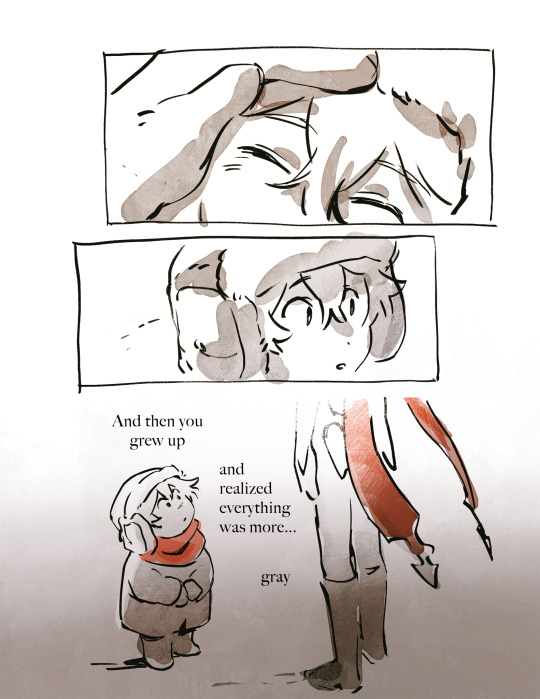


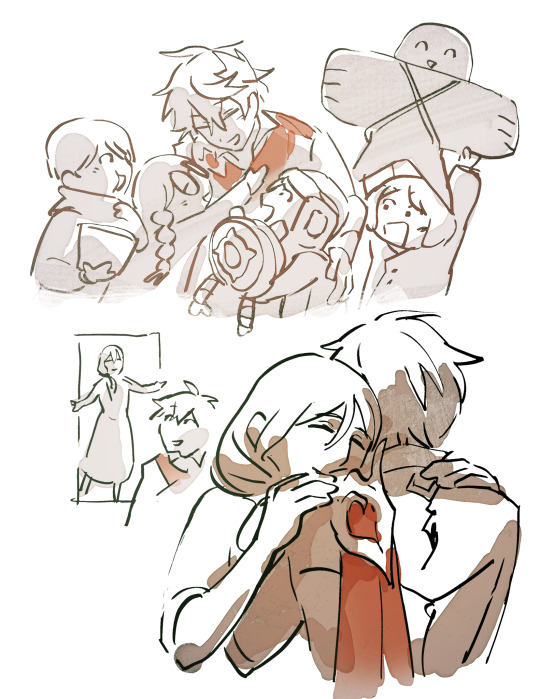
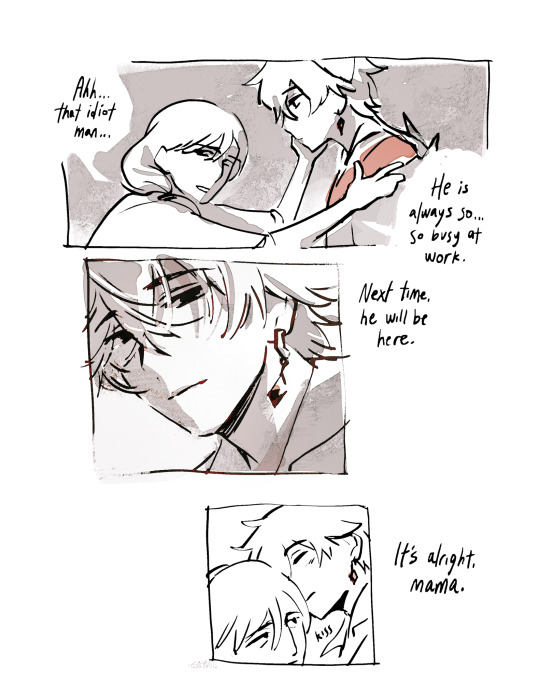
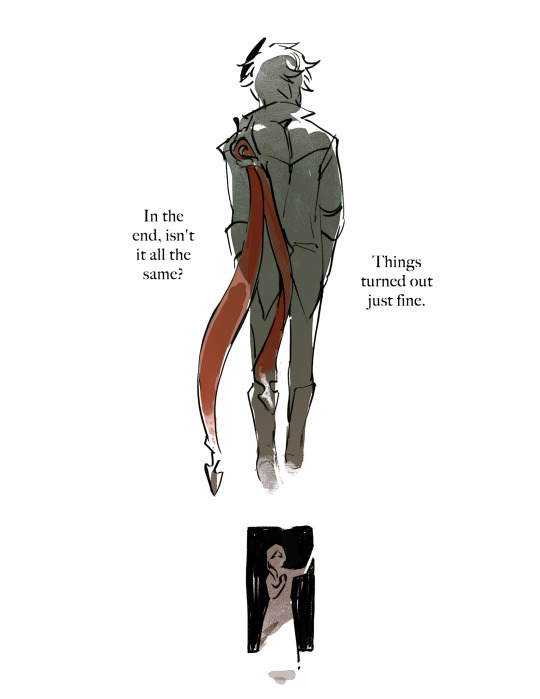
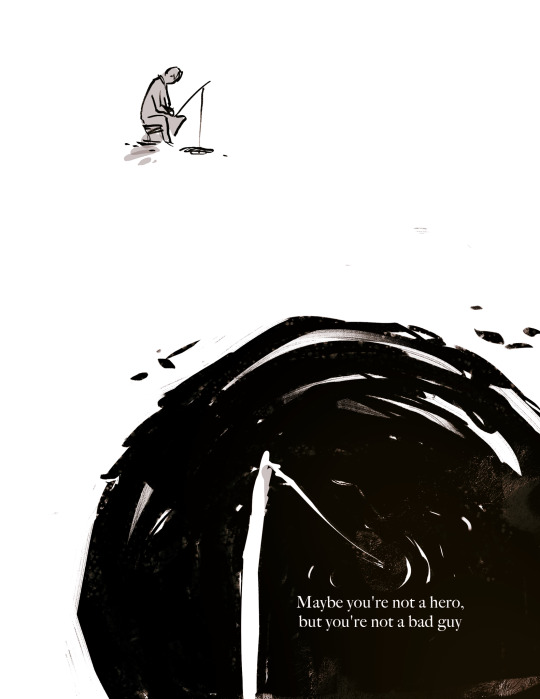
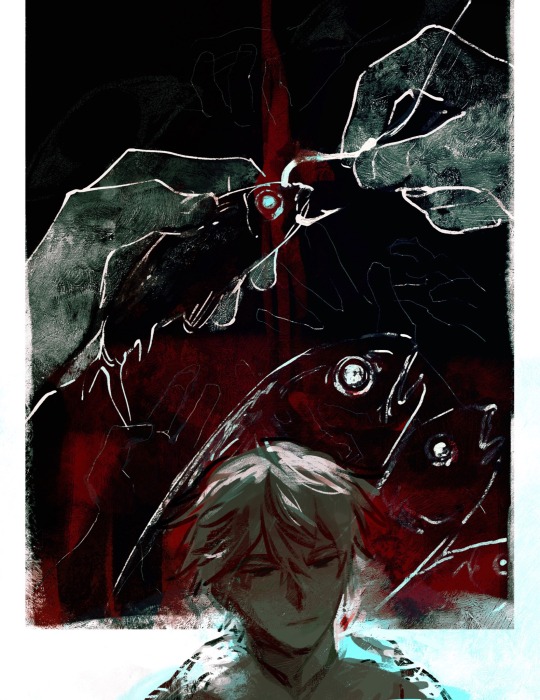

one who had dreams of being a hero
This comic is based on Story 3, which speaks of his hobby of ice fishing originating from the days he'd go out with his father on the ice, 'accompanied by his father's unending tales of adventure,' and dream of being the protagonist.
Nowadays, he keeps up the hobby, though only as a method of training... and it seems he fishes alone.
I thought a lot about fairytales and stories told to children -- how they are used to impart lessons and shape a child's growing sense of morality.
I think these stories were Childe's father telling him what kind of man he hoped his son would become.
In Story 5, 'his father had no choice but to hand his beloved son over for conscription into the Fatui' in an attempt to discipline his temper, but was disappointed when Childe continued ascending the ranks, further and further from the gentle boy he was..
His father named him after the hero Ajax. Is he still disappointed in the path Childe has taken? Does he still see his son in the man he sees before him? Does Childe feel in himself the chasm between who he dreamed of becoming and who he is now?
It's interesting, that fairytales should often have a very strict good/evil morality. Childe professes he has no use for such things, and will gladly become a mindless weapon so long as he can continue honing himself for battle. And yet, has he truly given up on being human?
For a Harbinger, Childe is oddly principled, preferring straightforward battles without deceit. He retains a sort of moral code, reluctant to involve those who are defenseless in his plans.
And of course, he deeply cherishes his family. What sort of weapon has a family? Why does he cling so desperately to this identity as a defender of childhood dreams, of being his sister Tonia's knight?
Perhaps his own dream of being a hero died long ago, but a part of him still recognizes the tragedy of it and maybe... in some way, is still trying.
This is somewhat of a companion piece to my Scara comic "one who has given up on being saved". Childe, unable to live up to his childhood ideals of heroism, and Scara, whose pleas for help went unanswered.
A failed hero, and someone who never had one.
ARGHH yknow it drives me nuts. I haven't known peace since I started thinking about it.
#VERY LONG POST sorry i'm really normal about them. please enjoy my essay#childe#genshin impact#genshin impact fanart#childe fanart#teucer#fatui harbingers#my art#my comics#happy birthday childe.. sorry my present is a comic about what a disappointment you are to your father..
6K notes
·
View notes
Text







So, your last name is Dekarios?
#bg3edit#baldur's gate 3#bg3#baldurs gate 3#gale dekarios#gale of waterdeep#morena dekarios#gale x tav#tav x gale#gamingedit#dailygaming#otp: celestial bodies#ch: gale dekarios#vg: baldur's gate 3#series: baldur's gate#gif: mybg3#in celebration of patch 7 finally making this dialogue available in game \o/#i am so sorry this gifset is so long but i could write an essay on his micro expressions alone
699 notes
·
View notes
Link
“The most important part of my job is to make the library a safe space. One where kids burst through the door and go running with glee to the children’s area so they can say hello to whoever is at the desk. One where a patron can have a full metal meltdown about the state of the world and still be given resources to find housing, a shower, a meal. One where someone can come in blasted high for years and then return the next day sober and clean, ensconcing themselves in the safety of the books to stay that way.”
Lisa Bubert’s Instagram bio reads "Public librarian who has seen some 💩," and her latest piece makes clear just how much “some” is. When so much of our society has seemingly turned its back on its neediest members, public libraries have never been more important. To read “Safety Net,” head to Longreads.
1K notes
·
View notes
Text
I have to talk about Chester Arthur. His story makes me go crazy. A mediocre president from the 1880s who's completely forgotten today has one of the best redemption stories I've ever heard and I need to make people understand just how cool his story is.
So, like, he starts out as this idealist, okay? He's the son of an abolitionist minister and becomes famous as a New York lawyer who defends the North's version of Rosa Parks whose story desegregates New York City's trolley system.
Then he starts getting pulled into politics and becomes one of the grimiest pieces of the political machine. He wants money, power, prestige, and he gets it. He becomes the right-hand man of Roscoe Conkling, the most feared political boss in the nation, a guy who will throw his weight around and do the most ruthless things imaginable to keep his friends in power and destroy his enemies.
Because Arthur's this guy's top lackey, he gets to be Controller of the Port of New York--the best-paying political appointment in the country, because that port brings in, like, 70% of the federal government's funds in tariffs. He gets a huge salary plus a percentage of all the fines they levy on lawbreakers, and because he's not afraid to make up infractions to fine people over, he is absolutely raking in the dough. Making the rough equivalent of $1.3 million a year--absolutely insane amounts of money for a government position. He's spending ridiculous sums on clothes, buying huge amounts of alcohol and cigars to share with people as part of his job recruiting supporters to the party, going out nearly every night to wine and dine people as part of his work in the political machine. He's living the high life. Even when President Hayes pulls him from his position on suspicions of fraud, he's still living a great life of wealth, power, and prestige.
Then in 1880, his beloved wife dies. While he's out of town working for a political campaign. And he can't get back in time to say goodbye before she dies. Because he's a guy who has big emotions, it absolutely tears him up inside, especially because Nell resented how much his political work kept him away from home. He has huge regrets, but he just moves in with Roscoe Conkling and keeps working for the political machine.
And then he gets a chance to be vice president. The Republican Party has nominated James Garfield, a dark horse candidate who wants to reform the spoils system that has given Conking his power and gave Arthur his position as Port Controller. Conkling is pissed, and he controls New York, and since the party's not going to win the election without New York, they think that appointing Conkling's top lackey as vice-president will pacify him.
They're wrong--Conkling orders Arthur to refuse--but Arthur thinks this sounds like a great opportunity. The only political position he's ever held is Port Controller--a job he wasn't elected to and that he was pulled from in disgrace. Vice President is way more than he could ever have hoped for. It's a position with a lot of political pull and zero actual responsibilities. He'll get to spend four years living in up in Washington high society. It's the perfect job! Of course he accepts, and Conkling comes around when he figures out that he can use this to his advantage.
When Garfield becomes president, Arthur does everything he can to undermine him. He uses every dirty political trick he can think of to block everything that Garfield wants to do. He refuses to let the Senate elect a president pro tempore so he can stay there and influence every bill that comes through. He all but openly boasts of buying votes in the election. He's so much Conkling's lackey that he may as well be the henchman of a cartoon supervillain. On Conkling's orders, he drags one of Garfield's Cabinet members out of bed in the middle of the night--while the guy is ill--to drag him to Conkling's house so he can be forced to resign. He's just absolutely a thorn in the president's side, a henchman doing everything he can to maintain the corrupt spoils system.
Then in July 1881, when Arthur's in New York helping Conkling's campaign, the president gets shot. By a guy who shouts, "Now Arthur will be president!" just after he fires the gun. Arthur has just spent the past four months fighting the president tooth and nail. Everyone thinks he's behind the assassination. There are lynch mobs looking to take out him and Conkling. The papers are tearing him apart.
Arthur is absolutely distraught. He rushes to Washington to speak with the president and assure him of his innocence, but the doctors won't let him in the room. He gets choked up when talking to the First Lady. Reporters find him weeping in his house in Washington. Once again, death has torn his world apart and he's not getting a chance to make amends.
Arthur goes to New York while the president is getting medical treatment, and he refuses to come to Washington and take charge because he doesn't dare to give the impression that he's looking to take over. No one wants Arthur to be president and he doesn't want to be president, and the possibility that this corrupt political lackey is about to ascend to the highest office in the land is absolutely terrifying to everyone.
Then in August, when it's becoming clear that the president is unlikely to recover, he gets a letter. From a 31-year-old invalid from New York named Julia Sand. A woman from a very politically-minded family who has been following Arthur's career for years. And she writes him this astounding letter that takes him to task for his corrupt, conniving ways, and the obsession with worldly power and prestige that has brought him wealth and fame at the cost of his own soul--and she tells him that he can do better. In the midst of a nationwide press that's tearing him apart, this one woman writes to tell him that she believes he has the capacity to be a good president and a good man if he changes his ways.
And then he does. After Garfield dies, people come to Arthur's house and find servants who tell them that Arthur is in his room weeping like a child (I told you he had big emotions), but he takes the oath of office and ascends to the presidency. And he becomes a completely different man. His first speech as president mentions that one of his top priorities is reforming the spoils system so that people will be appointed based on merit rather than getting appointed as political favors with each change in the administration. Even though this system made him president. When Conkling comes to Arthur's office telling him to appoint his people to important government positions, Arthur calls his demands outrageous, throws him out, and keeps Garfield's appointees in the positions. "He's not Chet Arthur anymore," one of his former political friends laments. "He's the president."
He loses all his former political friends. He's never trusted by the other side. Yet he sticks to his guns and continues to support spoils system reform. He prosecutes a postal service corruption case that everyone thought he would drop. He's the one who signs into law the first civil service reform bill, even though presidents have been trying to do this for more than ten years, and he's the person who's gained all his power through the spoils system. He immediately takes action to enforce this bill when he could have just dropped it. He becomes a champion of this issue even though it's the last thing anyone would have expected of him.
He oversees naval reform. He oversees a renovation of the White House. He still prefers the social duties of the presidency, but he's respectable in a way that no one expected. Possibly because Julia Sand keeps sending him letters of encouragement and advice over the next two years. But also because he's dying.
Not long after ascending to the presidency, he learns he's suffering from a terminal kidney disease. And he tells no one. He keeps going about his daily life, fulfilling his duties as president, and keeps his health problems hidden. Once again, death is upending his life, and this time it's his own death. He's lived a life he's ashamed of, and he doesn't have much time left to change. He enters the presidency as an example of the absolute worst of the political system, and leaves it as a respectable man.
He makes a token effort to seek re-election, but because of his health problems, he doesn't mind at all when someone else gets the nomination. He dies a couple of years after leaving office. The day before his death, he orders most of his papers burned, because he's ashamed of his old life--but among the things that are saved are the letters from Julia Sand, the woman who encouraged him to change his ways.
This is an astounding story full of so many twists and turns and dramatic moments. A man who falls from idealism into the worst kind of corruption and then claws his way back up to decency because of a series of devastating personal losses and unexpected opportunities to do more than he could have ever hoped to do. I just go crazy thinking about it and I need you all to understand just how amazing this story is.
#history is awesome#presidential talk#i thought about his story again this morning#and was once again struck by the desire to chase people down and make them understand just how amazing this story is#and instead of harassing random strangers i decided to inflict it on tumblr again#my original essay was rather too long and dry and tangled up in too many other details#and didn't quite capture the 'i want to chase you down and look you in the eye and make you freak out about this with me' vibe of this stor#this still doesn't quite capture it but at least it's shorter#and prevents me from rambling to unsuspecting family members#sorry for inflicting this on you again but what else am i supposed to do?
4K notes
·
View notes
Text
Falmer appearance and attire headcanons
(click on drawings for more details and notes!)
Hair
In Skyrim, we pretty much only see two hair styles to go off of: completely bald and the hair the "shaman" have (which are also the only females we see (a post for another day)).
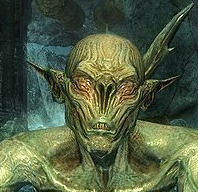
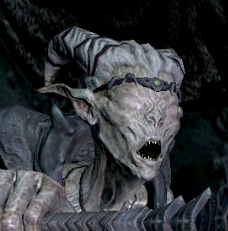
In concept art, particularly Adam Adamowicz's, we see more potential hairstyles. He draws it as wispy and messy, as well as containing braids and the ties we see in the shaman in the game. This art is largely what defines my own interpretation of their hair.
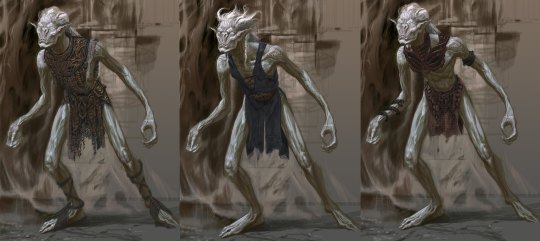

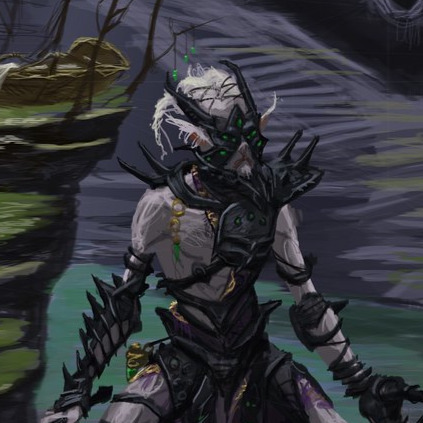
I picture the typical Falmer hair as wavy, thin, wispy, and looking frizzy. Given the high number of hairless Falmer we see, I imagine baldness is common, particularly among males, and sometimes among females. Their hair can be commonly styled into braids or knots to keep it under control.
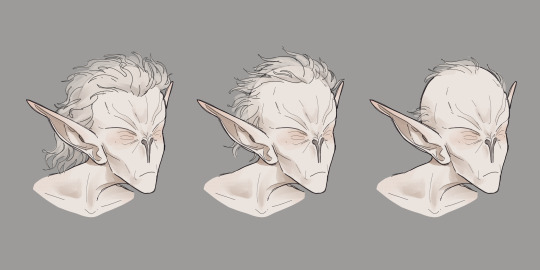
The ability to grow long, thick hair is less common, but those who can tend to style it in other unique ways. Especially among females, long hair is commonly styled into large dense locs (akin to a Polish plait) and held into shapes using ropes or leather ties.
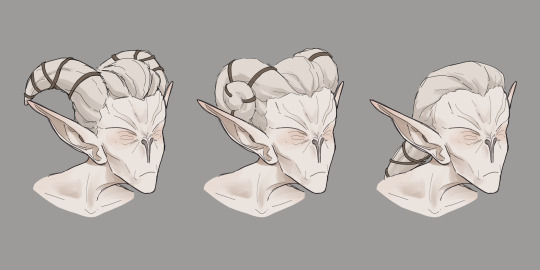
(While I think the intention with the way their hair is drawn and modelled in the game models and concept art was that it was braided and held up with those ties, before looking at it closely I always sorta interpreted it as too stiff to just be braided. As a result, I developed the locs headcanon and have become kinda attached to it even though I have 0 in game or lore support for it)
Materials
The material used in their clothing is obviously dependent on what is accessible to them, and given their unique situation that makes the materials they use and value unique as well. In Skyrim, we see that almost all of their armor (which is mostly what we see them wearing) and homes are made of chaurus chitin (and potentially shellbug chitin), so this is likely the most common resource available to them for non-combative coverings as well. Other materials from their arthropods companions could include their cocoons, unhatched eggs, etc.
Bones from other creatures (draugr, skeevers, trolls, adventurers, bandits, etc.) underground or from aboveground raids could also be used fairly often. These could also provide a source of leather or fur, albeit not a lot of it.
Falmer groups and subcultures inside or in close proximity to Dwemer ruins probably make regular use of the materials present in those ruins as well. With all the metal and machinery present in Dwemer ruins, metal probably makes regular appearances in their clothing (and general decorations) even if they can't manipulate it themselves. Falmer more separated from Dwemer ruins would make much lesser use of these materials, however. Additionally, We see implications of Falmer preparing, cooking, and potentially cultivating fungus in-game, but see nothing indicating they have any plants in their diet, and therefore it is unlikely they regularly make or use textiles or fabrics in their clothing, and if they do they likely come form Dwemer ruins or raided adventurers/bandits/settlements from the surface.
On that note, we know that there have supposedly been incidents of Falmer coming to the surface to attack its inhabitants and travelers, as well as instances of them killing bandits, adventurers, and researchers who venture below, so it's not far fetched to believe that they have access to some materials from the surface. This could give them some access to furs from surface animals, beads, glass, jewelry, textiles, metal objects, etc. they might not otherwise have access to. The rarity of these material among the Falmer would depend on the amount of access any given group of Falmer have to the surface, but among many of them these materials could be seen as more valuable for their rarity and the difficulty to gain them.
While gemstones and ore might be accessible from both natural deposits and underground ruins, unless they had some kind of auditory function or unique texture, they might not have much value to Falmer.
General Attire/Accessories
I like to imagine that the Snow Elves, and by extension the Falmer, have an innate cold resistance in the same way Nords do, and therefore don't require clothes for the purpose of warmth even in the chilly caves of Skyrim. Additionally, their blindness likely means that wouldn't dress for visual aesthetic either. My thoughts are that they are then left with the sense of sound and touch to communicate with each other, and their clothing and accessories could reflect that.
Falmer clothing, decoration, and society in general is very heavily based on touch and texture and little on appearances. They touch each other very often for both communication, movement, and just general day-to-day interactions, and their clothes isn’t very modest, but the tactile patterns and materials used can communicate certain things such as position in society, “wealth”/power, whether they are taken, single, pregnant, with a child, etc., their roles, their age, notable achievements/skills, who is who, etc. on both their clothes and buildings. The more noise one makes, the more attention they draw and the more they drown out other noises, and the more noise making things they can “afford” to have, so the amount of noise one makes in a Falmer settlement is a status symbol. Certain types of noises or noise makers are more coveted than others (chitin beads are common, while furs are less common, and materials only gained from raiding the surface are rare and coveted).
Some noise making accessories could include:
Dangling metal, bones, beads, chitin, etc. that hangs off of their clothing or ears and jingle/clank against each other (in my drawing I show them as pretty uniform in shape and size, but they would probably be much more irregular than I depicted them)
Bells (metal or other materials) that are affixed to or dangle off of their clothing or as earrings.
Hollow bracelets, anklets, necklaces, or other accessories that are filled with rocks or beads.
Rattles tied to the body (made of chitin, dried hollow chaurus eggs, dried chaurus cocoons, beads, etc.) with leather or rope.
Flute or whistle like tubes made of metal, chitin, or dried and treated tube-like fungus that makes a woodwind-esque noise when air passes through it in a certain way. They have been designed to make noise easily from even the slightest movements.
Dried grasses (more temporary) tied to the body that make a swishy noise. More permanently, a similar thing can be achieved with hair. The hair can be sourced from Falmer (either through just cutting hair or through taking it from fallen enemies) or killed humans/mer/draugr. That sort of thing can also act as a kind of trophy.
Necklaces with various materials dangling close together that jingle against each other.
Various materials can be tied into braids or the leather ties in their hair as well.
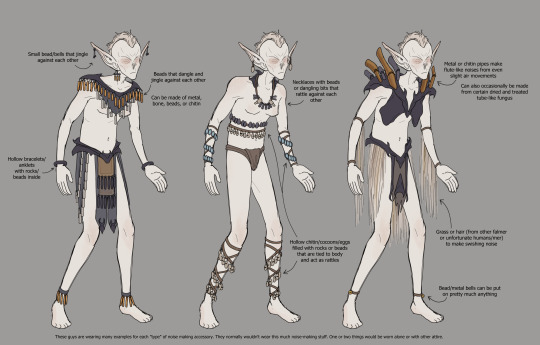
Some textural accessories could include:
Beads. Since they wouldn't have the ability to tell the color of the beads, the patterning of beadwork would be based on the roughness, material, size, or shape of the beads. (I'm sorry I suck as drawing beads)
Furs. This wouldn't be as common since the Falmer likely don't have too much interaction with furry mammals, but some they may have access to that are big enough to make clothing/accessories out of include skeevers or trolls (and potentially rarely animals from the surface). A potential meaning of wearing furs could be as hunting trophies, but it could have other meanings as well.
Chaurus chitin would like be the most common material in Falmer attire, and depending on the part of the chaurus body, the size of the chaurus, or the life stage of the chaurus it was sourced from it could have different textures. Some chitin parts could include large spikes and deep groves, while other parts could be smoother and less rough. The use of this chitin in clothing could take advantage of this contrast in textures. Additionally, chitin or shells from shell bugs might be a different texture from the chaurus chitin. (it's unclear to me whether shell bugs are exclusive to the caves around the Forgotten Vale or if we should consider them distributed throughout Skyrim's underground)
The placement of textured components on the body could have their own meaning to it alongside what accessories or textures are being used.
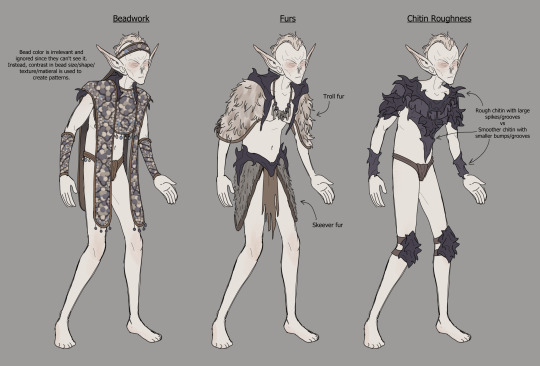
Specific Falmer Subcultures
While most Falmer settlements we see in Skyrim are just a small-ish collection of huts and chaurus corrals, there are two distinctive settlements that are larger, seemingly more organized, and I like to think have their own distinct subcultures worth mentioning: Blackreach and the Forgotten Vale. The unique scope and environment of these Falmer cities (as I like to think of them) could lend to unique clothing cultures as well.
The Falmer of Blackreach have access to a vast Dwemer settlement and have has the space to spread out throughout it more fully since it seems to be more in tact than other Dwemer ruins we see. These guys would likely have a clothing culture much more heavily based on what the can access from these Dwemer ruins (metal scraps, leftover fabrics, etc.)
The Falmer of the Forgotten Vale would also have access to unique resources, such as Vale deer, Vale sabre cats, and frost giants for fur and leather. Additionally, materials accessed from the Chantry of Auri-El such as textiles from clothing, bedding, tapestries, etc. could give them a greater access to fabrics than other Falmer groups. We don't see many close Dwemer settlements to the Vale, so they would have less Dwemeri influence in their clothing than other Falmer groups.
I like to think that the Falmer's evolution exclusively underground has made them poorly equipped to handle the outdoors during the day and has made them particularly susceptible to sunburn, necessitating the need for covering for those in the Forgotten Vale who have significant settlements outdoors. With greater access to textiles and leather, they could use them as coverings when outdoors.
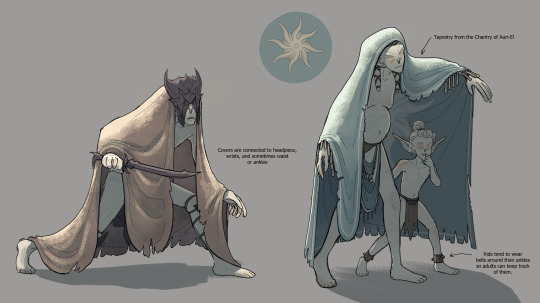
Armor
I actually have very few notes on armor, for two reasons. 1) I hate designing and drawing armor. It is the bane of my existence. 2) I really like the armor they have in game! I think they look awesome aesthetically, and I like how clearly they are made from chaurus chitin. Per usual, Adam Adamowicz's designs seem to have been the major inspiration for the Falmer armor, and he did a great jobs (even if it isn't the most functional looking armor ever).
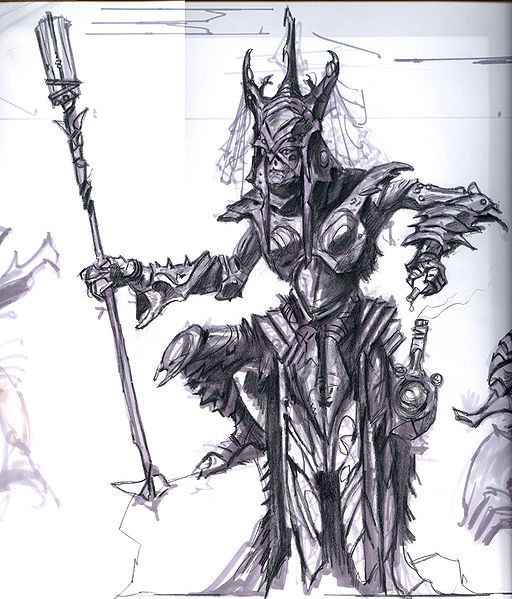
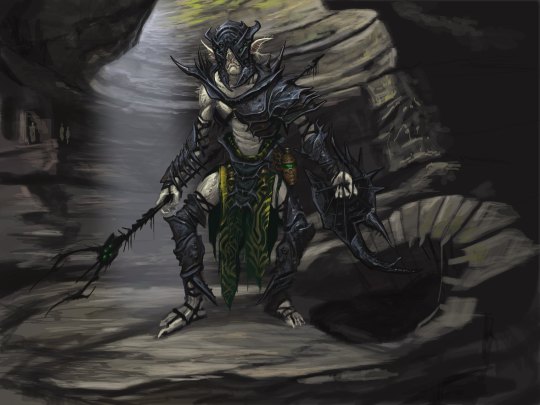
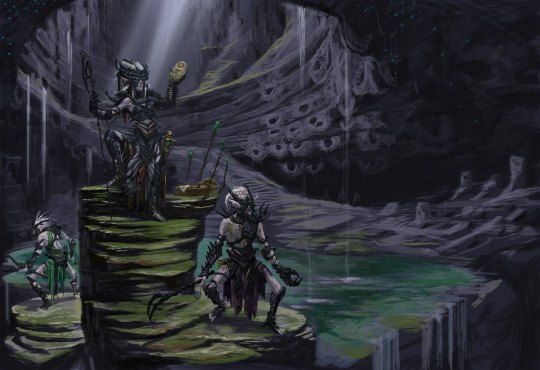
(off topic but I also just want to add that he draws them with little hairs and tufts on their ears and I love it. ok that is all)
I do have a few thoughts about armor though.
Even attire made of textiles make noise when someone moves in them, and I can imagine moving around in armor, especially armor made of hard, insect shells would make a lot of noise when someone moves around in it. When you're relying on sound to navigate your environment and pinpoint potential threats or targets, wearing something making a lot of noise would not be ideal. On the other hand, getting into a fight unarmored would be a problem.
So here's my solution: heavy armor (see below) would only be worm within the camps/settlements where noise was already high and space is more cramped (and therefore more risky in a fight) as a sort of guard in case they were attacked. Those guarding the settlements along the outside might still wear armor as well, but less of it. Those going out to scout or hunt (if they do hunt) would wear as little armor as possible, and try to wear it strategically so that it wouldn't rub against itself and make noise. This is why most Falmer we encounter in the game are wearing little except for loin cloths and kneepads.
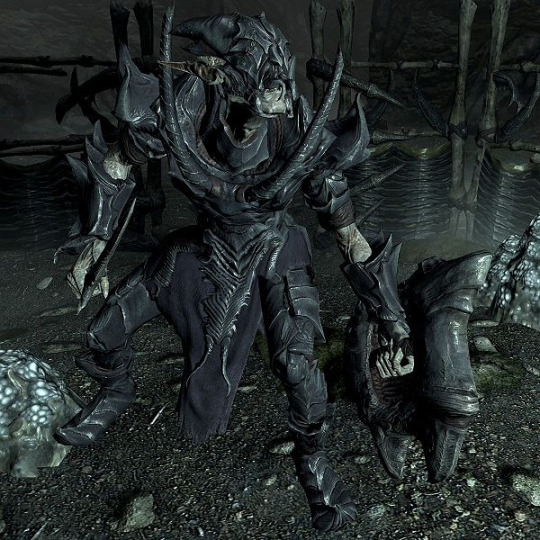
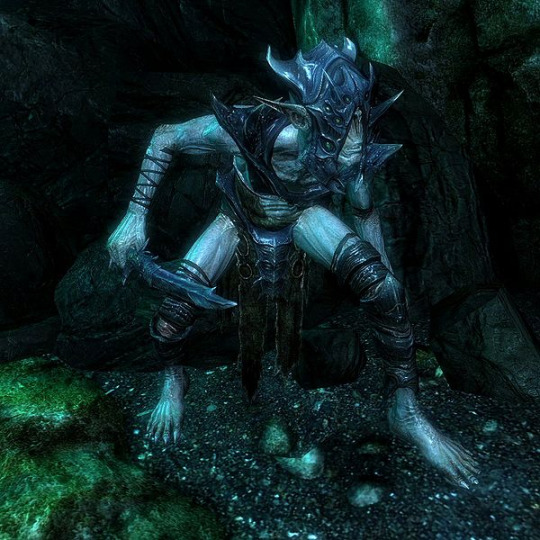
One more idea I have for armor is a specific armor piece. On the note of guarding or protecting a camp or settlement, I imagine the noises of it all (especially with the noise based headcanons I've laid out here) would make it hard to actually catch any potential threats when you can't see. A large slightly concave piece of armor worn behind the head could block out noises from behind the wearer, as well as a help focus sounds ahead of them.
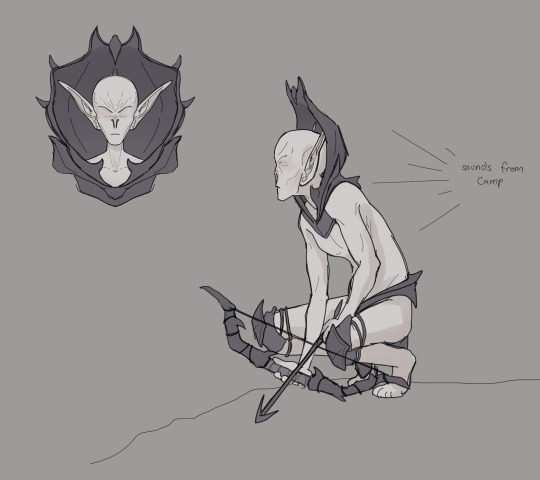
That is all! Thank you for reading! A lot of these concepts around the culture of sound I think could also be applied to their buildings and even a culture of music, but those are posts for another time.
All of the concept art I used was taken from here and all of the Skyrim screenshots are from UESP.
#skyrim#tes#the elder scrolls#falmer#skyrim headcanon#tes headcanons#headcanon#sorry this is long (but not really)#i just cant express my thoughts like a normal person. college conditioned me to format everything like an essay where i have to provide#sources and shit lol#also im kinda autistic about falmer#i appreciate those of you who read it all!#mine#adam's concept art makes me feel very validated in my echolocation headcanon because its very obvious he references bats in their face#which is another post idea i have for another day#my art
923 notes
·
View notes
Text
Female Guidance in Aventurine's Life
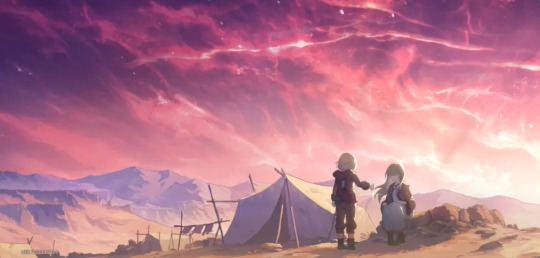
One thing I haven't seen discussed in much depth yet, but which I think is especially interesting, is the consistency of female guidance in Aventurine's life: Every single person who we have seen on screen offering Aventurine assistance or making a positive difference in his life is female (with one exception, yes, I'll get there).
Under the read more cause it's longggg:
Before even diving into his family, let's just get the obvious out of the way: Aventurine is, at least supposedly, blessed by a goddess. The very origin of his good fortune--be it actual blessing or curse--comes from the literal "mother goddess" who watches over him. This is one of the only instances in Star Rail where a god character is specifically given a gender, and Gaiathra is not ever ambiguous. She is the classic female fertility goddess with all the trappings of other famous triple goddess figures of the real world. Aventurine's personal belief in the goddess may be shaky, but he nevertheless continues to treasure his people's faith. Thus, at the core, we can say Aventurine is a character who is guarded by the most quintessential mother figure possible.
Now, with the most obvious out of the way:
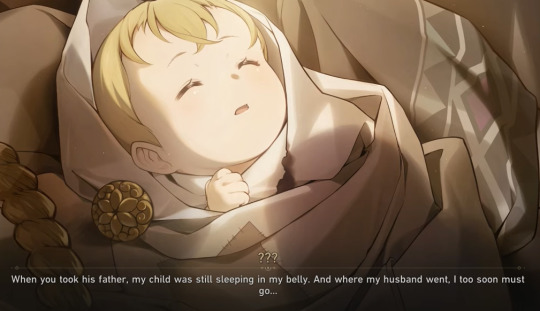
We know that Aventurine's father died before Aventurine was even born, and therefore he would not have any memories of his father, leaving him to be raised by his mother and sister.
Both women clearly made an enormous and lasting impression on Aventurine; they haunt every single one of his memories of Sigonia and are the key elements of the family Aventurine longs to return to. While he flirts with the concept of death as a way to see his family members again, it was also his mother and sister who instilled in him any sense of self-worth and meaning to his existence, the only things keeping him from giving up on living. His mother believed him to be blessed; his sister insisted to his face that not even the only remaining remnant of their mother had any value in comparison to his life.
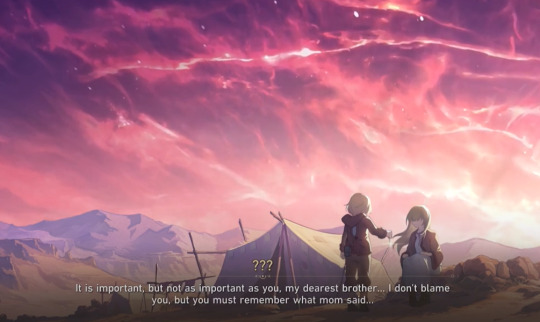
It is for his sister that Aventurine first begins expressing a self-sacrificial nature, and from his sister that this self-sacrifice is reinforced when she uses herself as a shield to help him escape massacre at the hands of the Katicans.
It is also from his sister that Aventurine learns many of the deeply meaningful actions he holds onto to the present day, despite having been so far removed from his own culture.
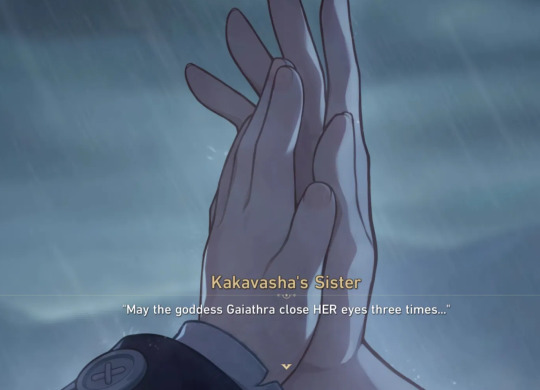
Conversely, every one of Aventurine's early negative experiences on screen appear to have been driven (at least primarily) by men.
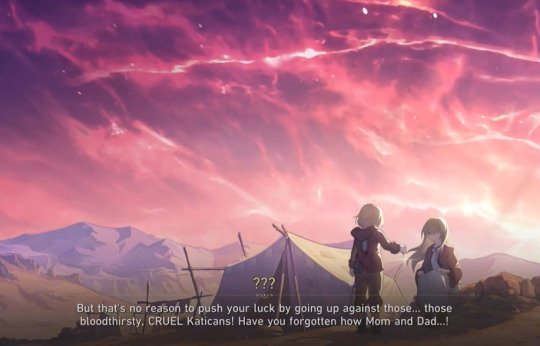
Although the Katican tribe of course would have both men and women, the tribal societies on Sigonia appear to be on the fairly traditional side, with Aventurine's mother staying at the camp with her child while his father was the one to go out and hunt for offerings for Gaiathra. This is also supported by Aventurine asking Jade to take him to her "chief" later on. Therefore, it is likely (although of course not guaranteed) that a majority of the Katicans' army was male, and that Aventurine's early experiences with outsiders consisted almost entirely of indiscriminate pillaging and massacre at the hands of what the Avgin viewed as savage, invading warriors. In separate instances, Aventurine was traumatized by these warrior figures three times--first with the loss of his father, then his mother, and then finally his sister.

And even their hope, supposed to come in the form of the "men in black" from the IPC, completely abandoned them, leaving Aventurine once again betrayed by masculine figures that were supposed to be there to protect him. Led by Oswaldo Schneider, another cruel male authority figure, the Marketing Department of the IPC permitted the wholesale slaughter of Aventurine's people--something which we know Aventurine is now aware of.
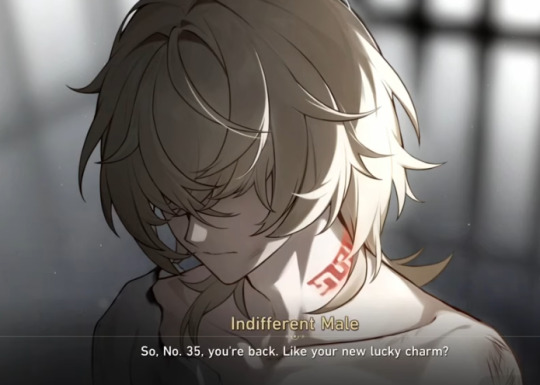
Then, of course, the next piece of Aventurine's backstory we're given is his male slave master. I don't really need to say anything about this, do I? This man violated Aventurine's human dignity and bodily autonomy, and forced Aventurine's hand in a life or death battle for which Aventurine still punishes himself mentally, even years in the future.
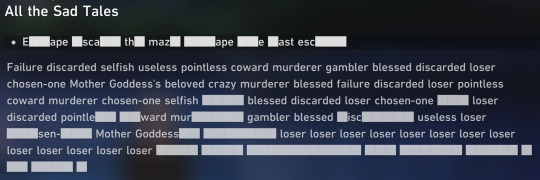
In part to escape the difficulty of his situation and rise to a position where he would have enough resources to--he thought--help his people, Aventurine joins up with the IPC. But when he attempts to make contact with a powerful man in the organization, Diamond, he is instead met by a woman, Jade, who against Aventurine's own expectations determines that she will raise Aventurine up (or use him as a tool, depending on how you currently choose to interpret Jade's motivations), granting him wealth and status beyond his imagination.
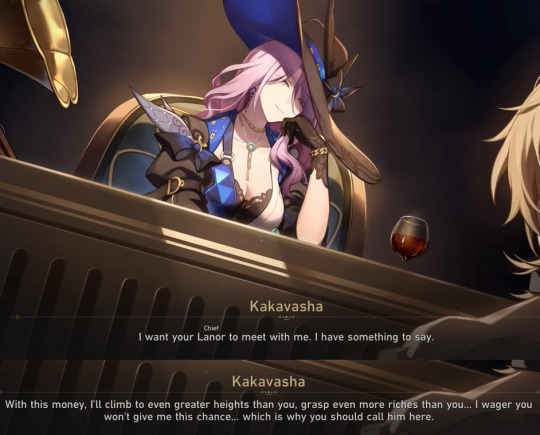
(And this line in particular is interesting, because you can take it one of two ways: 1) Aventurine comes from a patriarchal planet that traditionally put men into positions of power [thereby making his own slavery an emasculating act, aligning him further with disenfranchised women]; thus, he is making the assumption that to get anywhere in this organization, he will need to work with a man; or 2) He actually was counting on Jade taking his bet and helping him right from the beginning, because Aventurine perceives women as inherently more likely to protect and aid him than men would be.)
In the end, Jade does exactly as she claims she will, launching Aventurine into a position of power while also closing golden handcuffs around his wrists. She positions herself not only as his supervisor, but as his advocate and ally. She entrusts him with her Cornerstone, a sign of significant faith in his abilities. She even seems to be keenly aware of his bias towards the mother figure, referring to him as "child" in their conversations.

Whether this is genuine or a manipulation tactic can certainly be debated (and I'm not inclined to think at this point that Jade is a genuinely good role model or selflessly supportive person in Aventurine's life), but whatever the case, women are the only people Aventurine even remotely considers to be "in his corner."
We see this even earlier, in Aventurine's call to Topaz. Like with the example of his mother and sister, Aventurine trusts in Topaz's ability implicitly, and considers her above anyone else when it comes to completing the mission in Penacony.
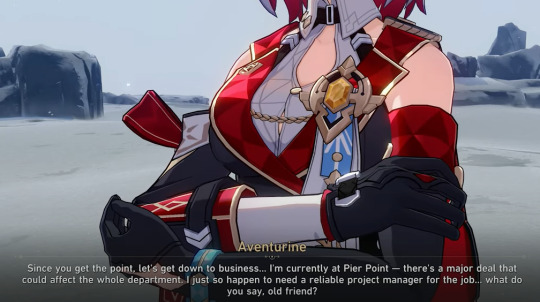
Although of course we don't know if Aventurine has any other friends or allies among the Strategic Investment Department, it seems very likely that Topaz, yet another woman, is the one he is closest with. At the very least, she is the only IPC character (so far) that Aventurine has a complimentary voice line for, one that shows his respect for her talent:

Over and over again, the story aligns Aventurine with female figures in positions of authority, and demonstrates that he is comfortable (although maybe not too comfortable, in the case of Jade) with relying on them and trusting their judgment, just as he did with his mother and sister.
And this pretty much goes off the charts in Penacony, where Aventurine has more involvement with the female cast than virtually any other non-female character (even the Trailblazer!). We set the pattern off right away, with Aventurine immediately being placed into a negotiation situation with Himeko, respecting her role as the Express's leader and working to get himself aligned with the Express by acquiescing to her request for support.
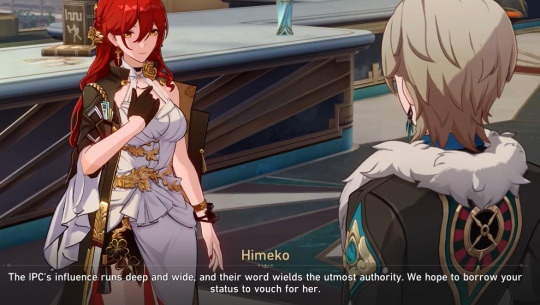
Then there's the fact that Aventurine is the one who finds Robin's body, an event which, although he didn't let it show too much, was almost certainly traumatic for him, given the violent death of his own sister.
Next, twice in Penacony's story, we see Aventurine seek out Sparkle for information. He may not personally like her and her comments may be both racist and dehumanizing, but Aventurine does rely on her--being the only character explicitly seeking her aid, which no one else in Penacony seems to want.
In 2.0...

And in 2.1.
Now, say it with me, guys: Aventurine built an entire portion of his grand plan around the idea that if he looked pathetic enough, a female character would absolutely come and help him. And sure enough, the women come through for him, always! Sparkle gives him the exact last clue he needs to confirm his belief that he could use "Death" to reach the true Penacony, sealing the deal for the rest of his plan.
His plan which also hinged significantly on Black Swan's involvement too, another woman that he views as, if not trustworthy, then at least intelligent and hyper-competent.
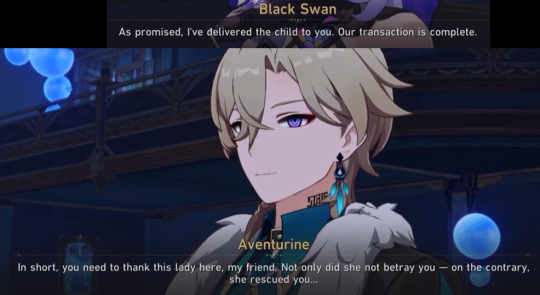
Contrast all this, of course, with the treatment Aventurine receives at the hands of Sunday, the lone opposing male character he faces in Penacony.
Sparkle implies that Sunday would humiliate Aventurine in an unmistakably sexual and degrading way, and Sunday himself professes this same desire to see Aventurine humiliated.
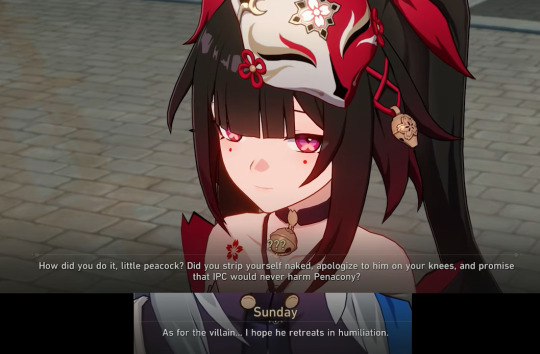
Then we're "treated" to the moment in which Sunday uses the Harmony's (or perhaps actually the Order's?) power against Aventurine, in a scene which is supposed to reflect an interrogation but is also, very clearly, another nonconsensual violation of Aventurine's bodily autonomy and dignity by a man. While ostensibly seeking confirmation of the Cornerstone ruse, Sunday instead subjects Aventurine to unnecessary questions about his past on Sigonia, which recall and force Aventurine to re-endure memories of his trauma.
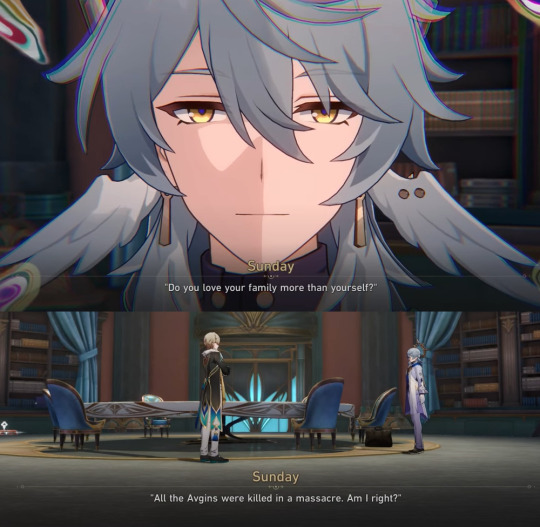
Even if this is what Aventurine prepared himself for and planned to have happen, the pain he experiences is very real, and he suffers both the physical and emotional consequences of Sunday's assault all the way up to his "Death" and possibly even beyond.
(Also, Sunday fans please don't get too up in arms with me for this; I also like Sunday! It's okay for characters to be morally grey!)
I think there's one other interesting example I would bring up here too, and that's Aventurine's conscious decision to weaponize his own masculinity against the Trailblazer. Through the 2.0 and 2.1 Trailblaze missions, Aventurine deliberately acts in an off-putting manner to the Astral Express crew, particularly the Trailblazer, in order to build up to the 2.1 climax where the Trailblazer is supposed to view him as an unrepentant villain and attack him without hesitation.
In order to achieve this uncomfortable, villainous effect, what does Aventurine do? Exactly what other men have done to him.
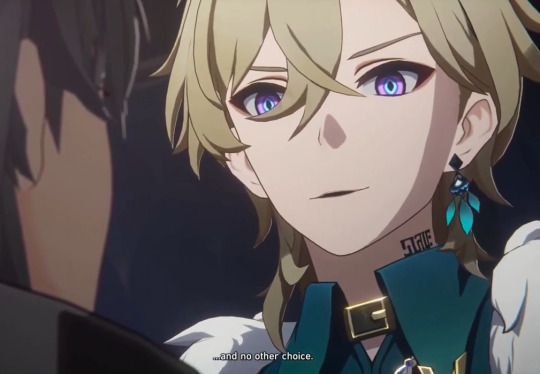
This is especially apparent if you're playing Stelle because of the ingrained societal taboo of a man entering a woman's personal space without consent, but even as Caelus, it is very clear that Aventurine is leveraging behaviors typically used to show dominance: In a complete 180 to all Aventurine's other body language in the game (normally quite withdrawn, frequently in defensive postures with his arms crossed or hand behind his back, almost always standing several feet away from other people), Aventurine violates the Trailblazer's personal bubble, looming over them (Caelus was sitting in this cutscene, lol), forcing eye contact, and commanding the space while informing them that they will have no choice.
For someone who was hunted, enslaved, had his movements restricted with chains, and due to his own slight stature has very likely been towered over by others who were intentionally asserting their power over him all his life, it is clear that Aventurine associates dominant, typically more masculine-coded physically-imposing behaviors with discomfort and even villainy.
Any girl who has ever had a man loom over her like this will realize very quickly: Aventurine wanted to make himself scary so he made himself act more like a bad man.
(Yes of course I know "not all men." I'm not saying every man behaves in this domineering way or that women cannot be domineering too, obviously, just that Aventurine had a very specific image in mind when constructing a "villainous persona," and the physically controlling tactics most typically used by aggressive men toward women was his immediate go-to.)
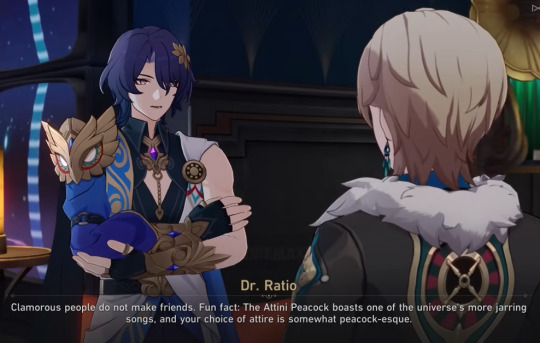
But where does that leave Dr. Ratio, the one male character actually on Aventurine's side?
Frankly, I don't want to derail my post about how intensely Hoyo chose to hammer on the message of "Women will protect you" in Aventurine's story with a discussion about a mlm ship, but the take-away here is going to lead in that direction anyway--so yes, Dr. Ratio is the exception.
What is interesting is that he does not come across as an exception at first, and in fact initially appears as another male character being rude and dismissive to Aventurine. Like, there are still people out there calling Ratio an unrepentant racist for this one.
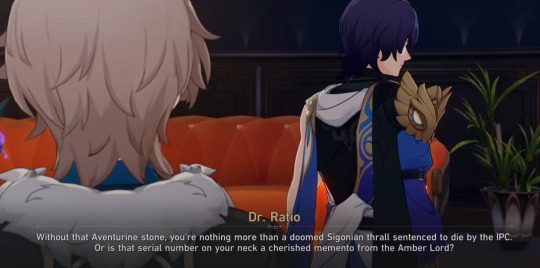
Of course, it's later clarified that this is an act--likely even these insults were scripted specifically to give Sunday's spying ears the "insight" he needed to exploit Aventurine during the interrogation.
But even though it is an act, Aventurine still has noticeable trouble putting his faith in Ratio. He does genuinely doubt him a few times, despite knowing that they are working together to fool the Family.
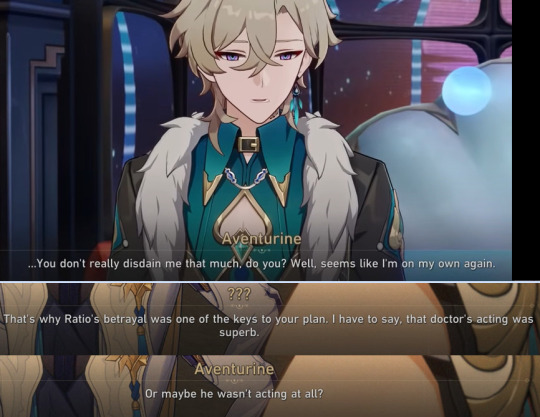
Even his voice line about Ratio confirms that he doesn't think Ratio particularly cares for him; rather, he thinks Ratio simply tolerates him because he's slightly less unintelligent than those around them.
Ultimately, the entire act with Ratio ends up being a mirror of the real scenarios Aventurine has been experiencing with men his whole life (at least as far as we are shown his life). Men abandon him to fend for himself (unwillingly, like his father, or willingly, like Diamond leaving Aventurine to deal with Penacony alone on the inside). Ratio keeps leaving Aventurine completely alone. Men attempt to humiliate him and violate his boundaries (like Sunday and his slave master). Ratio insults Aventurine's appearance and intelligence repeatedly. Men betray him (like Oswaldo Schneider and his men leaving the Avgin to die). Ratio "betrays" him.
I'm not saying when Aventurine devised the plan for their act, he consciously drew up a list of all the ways men had hurt him in the past and had Ratio re-enact them one by one, but like... that's what happened, whether or not Aventurine intended it.
And okay, the shrinking scene in Dewlight Pavilion was just for fun and probably only slightly fetishy, the devs promise; yes, it was supposed to be a joke! ...But it's also not a mistake that this is yet another instance of a male character in a glaringly metaphorical position of power over Aventurine. Aventurine's tiny in this scene! He's completely vulnerable! He's in a dangerous position and the male character could very much hurt him in this moment.

But Ratio doesn't. (In fact, his line here is supposed to be sarcastic, very ha ha--but also, what is Ratio really saying? "I won't do anything to you without your express consent." What a good guy.)
Virtually everything negative that we see in 2.1 is Ratio doing these things as an act at Aventurine's own request. He doesn't actually disdain Aventurine; his own voiceline about Aventurine reinforces that he sees Aventurine as talented and intelligent.
Whatever you think he was apologizing for in their early scene, he's the only person we're ever shown in-game apologizing to Aventurine at all.
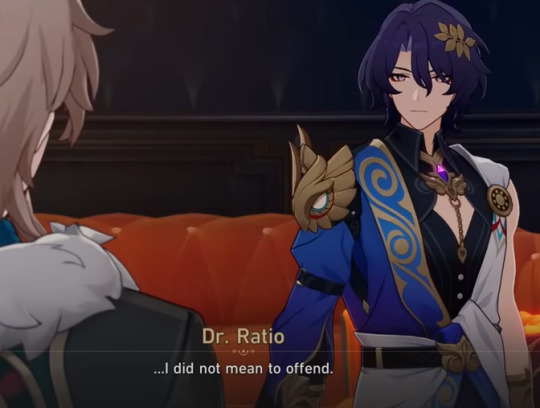
He worked hard to "betray" Aventurine but only as he was instructed to do, and immediately checks in on Aventurine's well-being afterward, even urging him to give up the plan if it becomes too much to handle.
And then, of course, there's the note: "Do stay alive. I wish you the best of luck."
After this point, it cannot be denied that Ratio is unequivocally on Aventurine's side, wants to help him, and is not doing so out of any sense of self-gain but largely because he is a good person who simply cares about Aventurine's fate. By the end of 2.1, it can no longer be doubted that Ratio is the exception to the "gender rule" of Aventurine's life, which--the story shows us again and again--was that guidance, protection, and care for Aventurine come from women, while men repeatedly represent dismissal, betrayal, or pain.
Ratio is, at least as far as Aventurine's story shows us, the proof that men can be good, that things are not as black and white in Aventurine's life as they might appear, and that--if you do choose to ship him with or see Aventurine as attracted to men--his attraction could be validated (and potentially reciprocated) by a male figure who would not bring additional harm to Aventurine's life. Aventurine makes the final decision to live after seeing Ratio's note--the exception to the rule ultimately proves to be the last piece needed to keep him alive.
But I promised I wasn't going to derail my own post about w o m e n, so let me get to the final point, and the one I really wanted to talk about: Although Ratio gets virtually all the credit for "saving" Aventurine in the fandom, Aventurine was actually saved by, you guessed it, another woman.
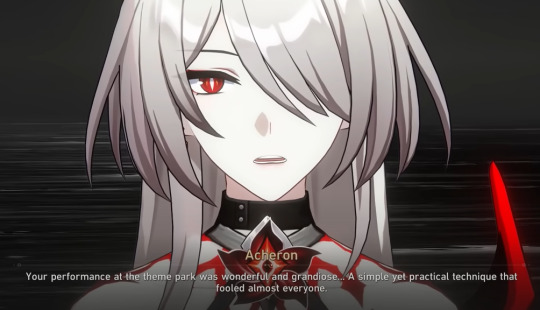
Not going to lie, the reason I started this post was specifically because I wanted to talk about how Acheron and Aventurine's dynamic was completely unexpected but actually fits flawlessly with the theme of feminine guidance in Aventurine's story.
Despite the fact that Aventurine made Acheron's life much harder and actively used her as a chip in his grand gamble, she doesn't blame or chastise him for those actions. Although she expresses some incredulity that Aventurine is actually that lucky, she then turns around and congratulations him for his ingenuity, immediately supporting him despite the fact that they don't even truly know each other.
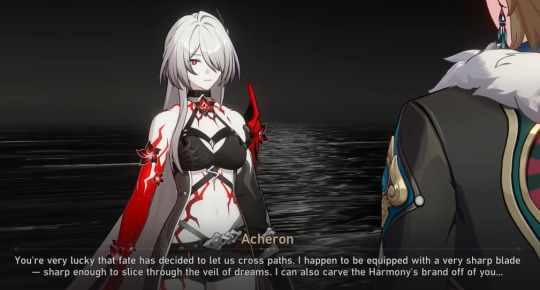
Then it gets even more interesting. Acheron, who frequently hits her companions with deep and sometimes very emotionally fraught questions, asks Aventurine: "Have you never wavered?"
We as players know for a fact that Aventurine is constantly wavering, constantly doubting himself, his luck, and whether he'll even live--or even wants to live--to see tomorrow. But we also know that Aventurine is not forthcoming about those truths, refusing to express them to anyone, even himself. The only way we hear those dark truths is through his "future" self (who by the way, is once again another male figure cutting Aventurine down--of course it's himself but it's also, from the player's perspective, once again reinforcing the message that he isn't going to find safety or kindness in an adult male presence). Aventurine almost constantly deflects and diverts when his emotions or struggles are brought to the fore (unless he's divulging them for the specific purpose of allowing someone else to weaponize them). "I'm fine," he says, like a lying liar who lies.
But he doesn't lie to Acheron.

He chooses to be completely candid with her, to lance open the deepest wound of his life--that he can win and win and win and still have lost everything. The glitz and the glamour has all been stripped away here, at the end of everything, and Aventurine finally feels safe enough to admit that he fears he has absolutely nothing in his life worth living for.
And then, we get this direct parallel: Aventurine looks to Acheron, the woman now before him, for guidance, for explanation, exactly as he looked to his sister in the past.
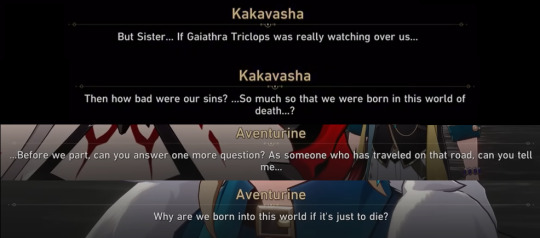
He needs help, he needs answers, and he is continually seeking that help from the female figures in his life, whose support and kindness echo the lost care of his mother and sister.
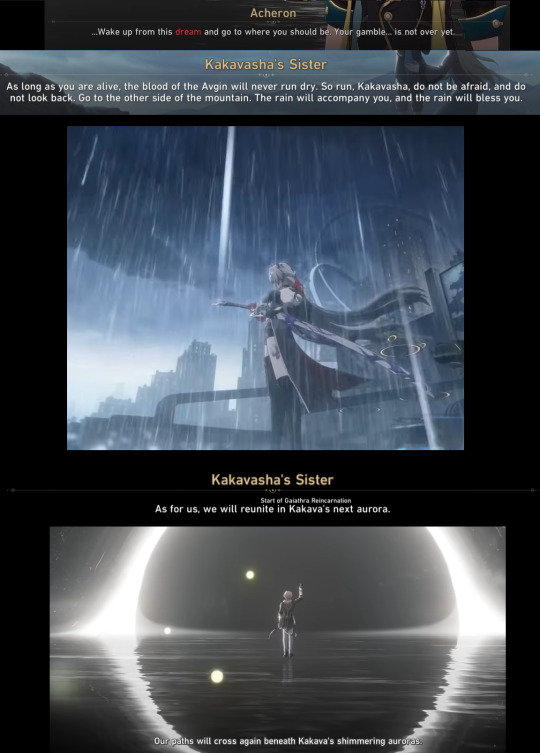
"Go where you should be," Acheron tells Aventurine, guiding him across the river of death just as his sister insisted that he flee through the rain toward life.
Look guys, Acheron's even the one who reminds Aventurine to look at Ratio's note in the first place because apparently being an emanator of Nihility gives you x-ray vision, but my girl just gets no credit at all for being Aventurine's real savior, come on now!! Yes, Ratio's note was the final reminder Aventurine needed that someone would be waiting for him on the other side, but Aventurine would never have even gotten to the point of being willing to read that note if Acheron hadn't stepped in and provided him an answer to his question.
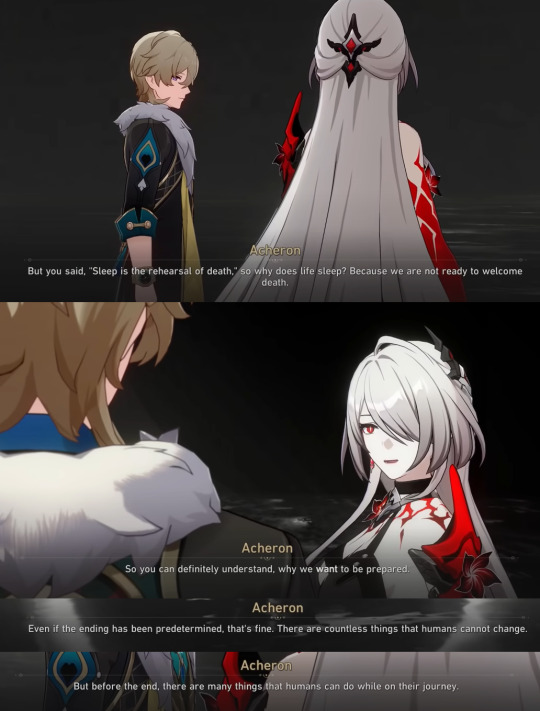
She feeds him back his own answer: "Why does life slumber? To rehearse the death for which we are not currently prepared." It is Acheron who reminds Aventurine that giving into the Nihility is pointless, and that rather than simply embracing a meaningless death, it is up to humanity itself to find and make meaning by living. It's this, not Ratio's note, that Aventurine gives as his reason for choosing to go on when asked by his own younger self. It's Acheron's words that finally give Aventurine an answer--why do we live just to die? Because there are people we can still make proud. Because when we go into death, we should do so with our heads held high, having achieved our own sense of purpose in this life.
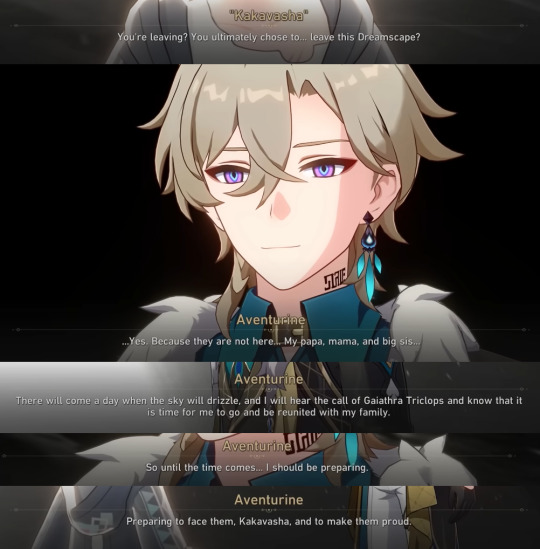
Ratio gave Aventurine a promise: Someone is waiting for you to come back.
But Acheron gave Aventurine a reason: If life is inherently meaningless, doesn't that just mean you are free to give it meaning yourself?
She saved him, as women have been saving him all his life.
Anyway, this has already been horrendously long, but really what I wanted to say is that I think it is absolutely fascinating how consistent Aventurine's writing is when it comes to portraying where his support comes from and who he seeks guidance from. (Psst, just in case you still haven't figured it out, it's women!) In virtually every instance we are shown, we see the message reinforced that women are Aventurine's greatest allies and role models, while male figures are continually positioned to intentionally or unintentionally let him down and cause him distress.
"But women playing the supporting role to a male character is nothing new, Star, why are you so excited by this?"
Because the role women are playing in Aventurine's life is not the subservient supporter and emotional crutch role that female characters all too often play to male counterparts. None of the women in Penacony or Aventurine's past were there to do the emotional labor for him, to be a trophy or prize, or to cater to his needs. They don't exist solely to help him fulfill his character motivations; they aren't following him around waiting for his next request as their only role in the plot.
Instead, with Aventurine's story, we almost have an inversion of gender roles, where the male character eschews the stereotypical "men are leaders, fighters, and stoic heroes" archetype. Instead, no matter how hard he tries to hide it and keep a stiff upper lip, it is clear from 2.0-2.1's story that Aventurine is a deeply insecure, lonely, and explicitly traumatized survivor of genocide, slavery, and exploitation. Unlike most male characters, who are very rarely portrayed as genuine victims--because come on, shouldn't men be strong enough to fight back? Shouldn't men be able to shrug it off when they are hurt, emotionally or physically? (Of course I'm rolling my eyes here!)--Aventurine is belittled, humiliated, emasculated, and victimized on-screen, roles almost exclusively reserved for women, for whom surviving victimization in fiction is seen as noble.
Meanwhile, the women in Aventurine's life take on the roles traditionally given to male characters. They're both emotionally and physically his protectors. Aventurine's sister gave her life to guard his safety; Acheron ensured he could safely pass beyond the river of Nihility into the Primordial Dreamscape. They give him the tools necessary to succeed where he could not succeed on his own. His plan could never have gotten off the ground without Topaz and Jade entrusting their Cornerstones to him. The knowledge and capabilities of the women around him--not their "feminine charms"--are what allow them to help keep Aventurine on the right path even though he does waver. Even women who disrespect him, like Sparkle, still play a positive role in his life, able to provide him insight gained with their own intellect and talents.
When he has no one to rely on and doesn't know what to do, Aventurine is able to continually turn to the women around him, asking for and receiving not servitude or fawning, but their genuine wisdom and guidance.
tl;dr: If nobody else has him, Aventurine knows this random woman he met two minutes ago on the street will have him, because the women in his life literally never let him down.
(It's just so, so good, and ultimately, it should be very clear why Aventurine's story is as popular with women as it is! A+, Hoyo!)
#honkai star rail#aventurine#acheron#topaz hsr#honkai star rail meta#character analysis#there's a bit of#ratiorine#in here too#but mostly I ramble about WOMEN#thematic parallels#thematic parallels everywhere#it's long#I'm sorry but not really#sometimes you act like a normal fan#other times you're me#and write essays that wouldn't be out of place in gender studies class#also I hit the '30 images per post' limit and had to make do#please ignore the terrible merging I did of the photos#don't perceive my MS Paint job
858 notes
·
View notes